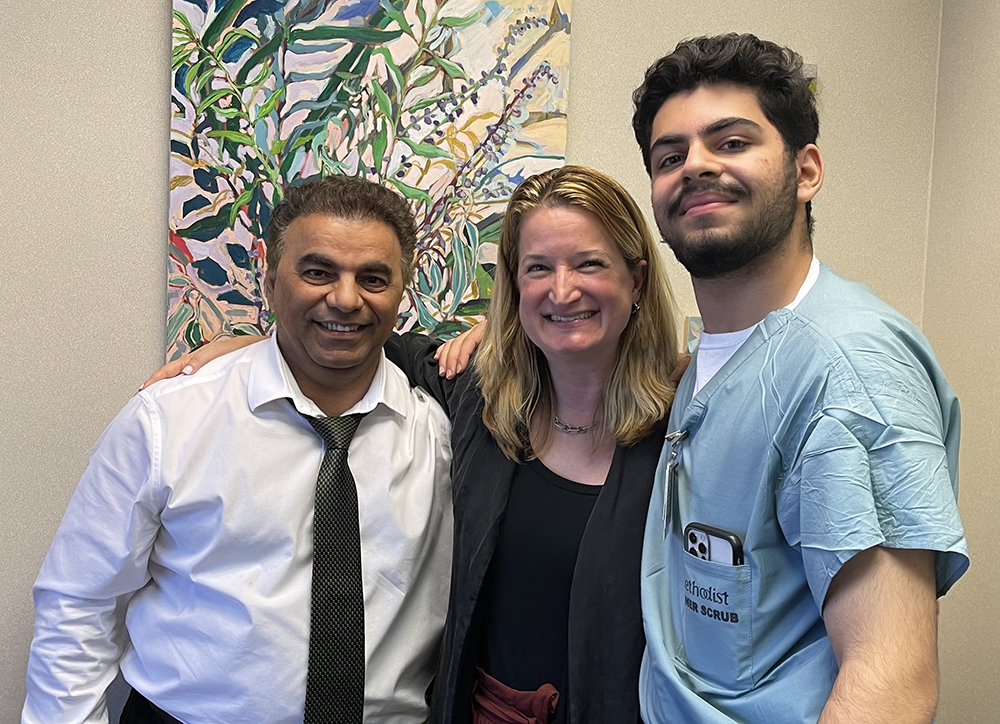My friend Joe Sinacore and I work in the field of kidney transplantation together, he in New Jersey and me in Houston. One evening we ate dinner together and he shared, “My taxi driver really wants to help his son Parsa, an incoming high school senior, get into medical school.” He explained that Peter Rajabi, his driver from the airport, had told him that most hospitals had stopped offering many opportunities to high school and college students to prevent the spread of COVID-19 for the last two years; they could not shadow medical professionals or observe surgeries as in years past.
Eliminating these glimpses into the medical world has had an impact on the next generation of people interested in being doctors. Some applicants do not have early medical experiences on their resumes, limiting their competitiveness. Others may never apply to be in the medical field since they were not exposed to it. On the evening before he picked up Joe, Peter shared that he was praying for a miracle. Joe told him, “Well, I’m a man of faith and I’m going to a dinner with local medical professionals tonight, so I will ask around.”
It was a coincidence that prior to Joe’s visit, I had been attending meetings of Houston Methodist Hospital’s Diversity, Equity, and Inclusion Committee to establish a Rising Stars High School Summer Internship Program in the Department of Surgery. Dr. Gaber, Chairman of Surgery, and Dr. Mobley, head of the DEI Committee, were focusing on expanding the diversity of professionals joining the field of medicine. Our team had built a six-week curriculum to allow high school students to meet diverse professionals in all healthcare fields, observe a surgery, and journal about their experiences.
After hearing Joe’s story, I felt called to help as a fellow Catholic myself. Without ever meeting him, I offered to talk with Peter by phone. When we spoke, Peter told me about Parsa, who, in his words, was a very determined and good person. He told me that Parsa was a straight-A student and committed to gaining experiences to help him become a physician. “I’m happy to refer him to the program,” I said, thinking nothing of it. I asked Parsa to send me his resume and forwarded it to the selection committee. When I told Dr. Gaber, he smiled and said, “God must really want this…and we can make it happen.”
We recruited students for our internship, not from the top performing Houston high schools, but from others. Some guidance counselors ruled out this opportunity for their students right away, letting us know that there wasn’t anyone who would even be interested. One student sent in a handwritten application because she didn’t have a computer. In the months before the internship began, Parsa would text me, usually after I was asleep, to assess the status of his application. His dad wished me “Happy Easter” by text as time went on.
Our selection committee chose a diverse group of students for the inaugural internship class. Parsa was selected, and I officially met him in person at the white coat ceremony that summer that kicked off the program. Physician scholars commonly begin their medical training by ceremoniously putting on a white medical coat inscribed with their name. We did the same for the 10 students in the program. I watched Parsa put on his white coat for the first time with a certain seriousness. Various parents were in attendance, but not Peter, who had to work driving his taxi.
During the weeks of the internship, I watched Parsa relaxing into community with his fellow students. I heard them laughing and sharing as they became comfortable with the hospital environment and spending time with healthcare professionals. Right before the internship ended, Parsa sent me a text to ask if he and his dad could meet with me. We met for an hour, all three of us. Parsa shared the most, talking animatedly about his favorite part of the internship, observing the surgery. “I am definitely going to be a surgeon now,” he said. His father and I smiled at each other, enjoying Parsa’s explosion of words and the hope and confidence emanating from him. Peter shared that they didn’t have any family in Houston. “Me neither,” I said, “but now you have a Houston Methodist Hospital family.”
Leaving my office, Peter told me that words could not describe how thankful he was that his son had been invited into this program. He told me I was a wonderful person with a good heart. I thought about the string of many people with good hearts activated by his prayer and love of his son – first Joe, then me, then Dr. Gaber, Dr. Mobley, and the many staff, doctors and healthcare professionals taking part in the Rising Stars program. It takes a good-hearted army to develop the next generation of diverse healthcare professionals. Here’s to one more new surgeon of the future, Dr. Parsa Rajabi.

